Share the page
Lebanon: Rebuilding the Economy from the Ground Up
Published on
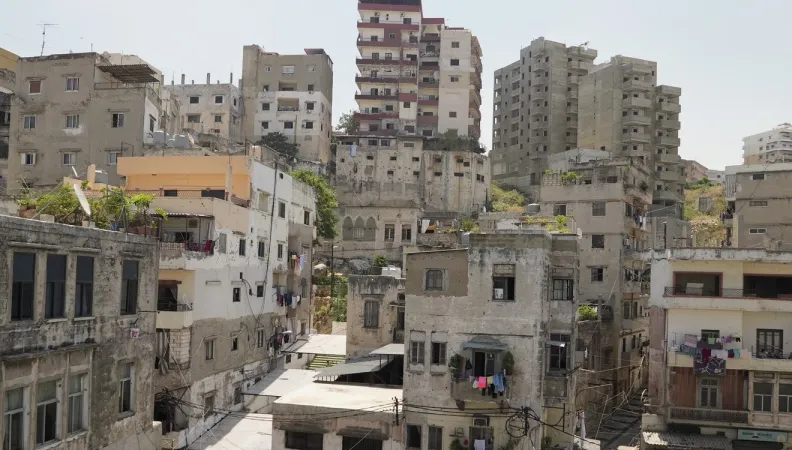
With crises multiplying in Lebanon, poverty has reached astronomical levels as the economy falters, and small and medium sized businesses struggle to survive. In the second-largest city, Tripoli, known as “the poorest city in the Mediterranean,” we look at its mounting difficulties and the work being done to overcome them, including initiatives to provide training and donate equipment to small companies.
Lebanon’s current economic malaise can be traced back at least to 2019, when a crisis in its financial sector dragged the rest of the economy down with it. Informal capital controls prevented depositors from withdrawing their savings, while the Lebanese pound lost 95% of its value.
Moreover, the Covid-19 pandemic caused hundreds of businesses to close, forcing people into unemployment and deepening impoverishment.
Two projects to support entrepreneurs: Watad and Maharat Li Loubnan 2 (MLL 2)
Sarah Al Charif works with Tripoli’s poorest populations and has seen the economic collapse up close. For the past 11 years, she has worked with the NGO Ruwwad Al Tanmeya to rebuild social cohesion between the residents of rival districts: the predominantly Sunni Bab El Tebbaneh neighborhood and the Alawite Jabal Mohsen neighborhood, where tensions have been exacerbated by the conflict in neighboring Syria.
The adjoining neighborhoods have borne the brunt of violent conflict since the early 2010s, with tension remaining high. “Both communities needed to realize that they were victims, manipulated by their political leaders. This came about by their learning to live together in harmony, through work and learning together,” says Sarah Al Charif.
It’s with this objective that the Watad project has helped support and build the skills of SMEs and micro-enterprises.
“In Tripoli, there’s a lot of poverty and many informal unregistered SMEs (Small and Medium Enterprises) that start up without market studies. They can’t make the right financial calculations or distinguish between personal and business expenses,” says Hanaa El Amine, Director of the Entrepreneur Support Program at the European Institute of Cooperation and Development (IECD).
“What’s more, entrepreneurs don’t know how to obtain financing, and they lack the administrative skills to develop their work and increase their income. Without help, many of these businesses are doomed to bankruptcy.”
Training that pays off
The crisis has led IECD and Ruwwad, in partnership with AFD, to provide administrative skills to existing businesses and start-ups via yearlong training courses. The training covers accounting, market research, development plans, digital marketing, corporate law, and more. “Participants learn how to make presentations so they can promote their business plan to other institutions and obtain funding. We also grant donations in kind—small amounts that lend a helping hand to develop businesses,” says Hanaa El Amine.
Participants must first go through a selection process. The donations in kind are offered to the most deserving projects at the end of the training.
“Some of the participants can’t read or write. Our target isn’t students or the middle class, but rather the most marginalized communities, to try and help the most fragile businesses,” says Sarah Al Charif. “We help them to make a profit, and above all to work together and to find new opportunities. If we see one person who draws and another who embroiders, we encourage the artist to sketch for the embroiderer!”
These programs have evolved to meet different needs as they emerge – first helping start-ups, and then providing support to existing businesses. “We’ve had a big impact on the lives of the participants,” says Hanaa El Amine. “Over 50% of them started their business within six months of the training. Their business is healthy and making a profit.”
Sarah al Cherif points also to increased purchasing power, and even self-confidence among beneficiaries. “They’ve learned that they can make their project a reality without having to plead or beg,” she says. “They’ve learned that we can live together and grow together, by being passionate about what we do. Our training courses recreate examples of success within the local community. That’s how change begins.”
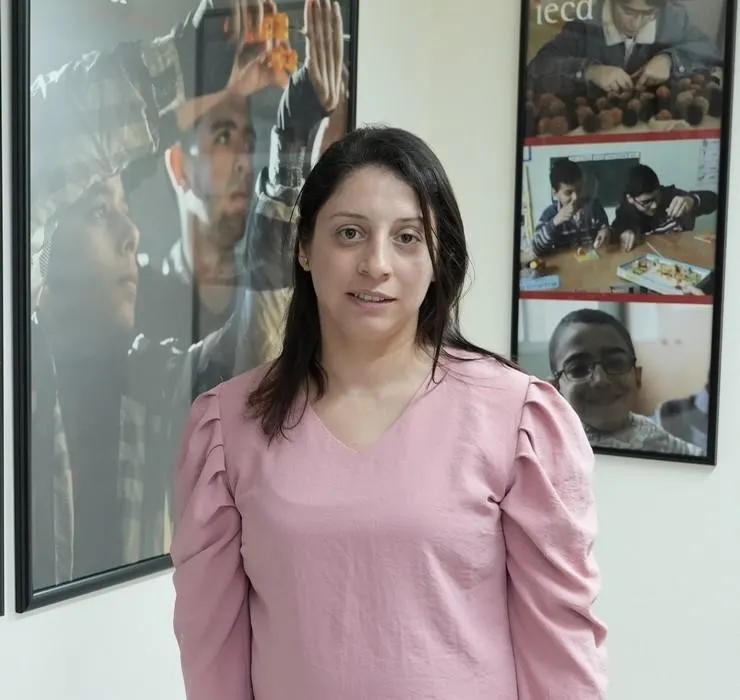
USING WOOD FOR SUSTAINABLE TRADE
The seeds of Adnan Al Taleb’s project were planted in 2020, when he was a journalist: “When I was covering forest fires, I discovered that 4% of waste in Lebanon is wood, the equivalent of 13,000 trees going to waste each year. I then began to think about how this waste could be avoided.” That’s how he and his partner Jana Tabikh launched the start-up “Zap Idea,” which uses recycled wood to build furniture, decorative items, and board games.
“We originally dealt directly with the customer, who gave us money, and then we went to different suppliers.” But with the fluctuation of the Lebanese pound, dealing with several different parties became a headache. “We had to have our own workshop and our own production line,” says Adnan.
Thanks to the Watad Project, Al Taleb received training in marketing and accounting. “Above all, I learned how to carry out feasibility studies, forecast the market, and calculate estimates that reflect the reality of the market,” he says. Ruwwad also provided Al Taleb and Tabikh with some of their equipment, including saws and wood-refining machines. This enabled them to start up their business, which now employs two people.
Their products have become popular among a growing number of people who care about the environment and are aware of the importance of buying recycled products. And Al Taleb is already thinking about the next step. “In five years’ time our brand will be global, because we’re turning waste into gold.”
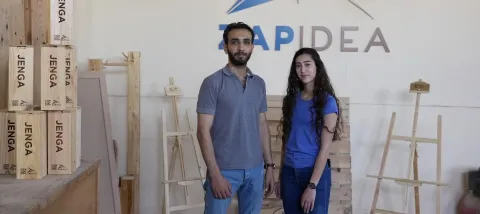
AFTER SCHOOL ARTS & THEATER FOR A CREATIVE EDUCATION
Rim Ali observed one afternoon that, in this disadvantaged neighborhood, children spend a lot of time after school on social networks or in the streets: “We wanted to help solve these problems. That’s how we got the idea of creating clubs, that’s to say after-school educational leisure services for children."
With her sister, Rim Ali founded Bloom Education Center in 2019, an academic teaching institute in Jabal Mohsen.
"The aim was to teach children new skills like drawing, music, and languages through theater," she said. "This helps stimulate their creativity.”
For the theater club, Rim needed to acquire a printer, projector, and computer, as well as speakers for the sound system. But Rim Ali’s earnings in Lebanese pounds were greatly reduced by the currency’s devaluation, making it impossible to save money.
But through MLL2 training, he saw solutions could be found, particularly in the management of a budget. “With the financial crisis, bookkeeping that’s not rigorous leads to disaster,” he said. “The marketing component also taught us how to appeal to customers with offers and new products. We’re now focused on development, and the equipment offered by IECD has been a great help. Instead of writing texts by hand, we can now print them out and show films to children using the projector. This allowed us to open the language-learning and theater club.”
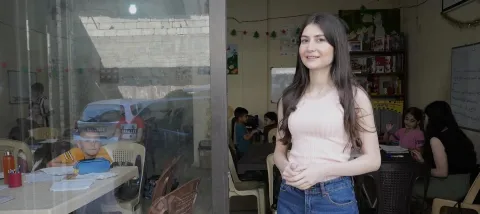
THE ULTIMATE GAMBLE: USING THE FAMILY'S SAVINGS TO OPEN A SHOP
Sahar Khadaro’s husband used to own a neighborhood generator. But when the crisis hit, he could no longer buy fuel, and his business collapsed. In 2021, with the money from the sale of the generator, Sahar had a bold idea. Rather than spending this money, she would buy merchandise and open a store – an idea in which her husband had little faith. “He’d tell me to think of our three children, that a project like this can’t provide enough income, and that sales would be limited in this small neighborhood,” says Sahar Khadaro.
It so happened that her brother was already operating a bookshop in Jabal Mohsen. But he had no knowledge of marketing, social media, or stock inventories. “I then decided to become his partner but, at the same time, I wanted to make my contribution, to develop his business, get a good grasp of social media, and expand outside the neighborhood,” says Sahar.
She learned management via MLL2 training: “I didn’t know, for example, how to include the price of gift wrapping, how to build up funds in case I didn’t sell enough for a month or two, or how to keep to a rigorous budget—all on a computer system.”
The IECD gave her a computer with accounting software. “At first, I wanted to get a color photocopier,” she said, “But after the training I realized that by investing in accounting software, I could get my finances in order and buy the photocopier myself.”
What started out as a bookshop gradually expanded to include the sale of toys and gifts, and second-hand books, which “help neighborhood parents with kids in school, since new books have become unaffordable,” she says.
Now they have partnered with a delivery company to serve customers beyond their district, and with Instagram, Tik-Tok, and Facebook pages, they advertise to all of Lebanon – and beyond. In the end, Khadaro’s gamble paid off. Having hired someone to cope with the growing business, the company now has a staff of two – including her husband.
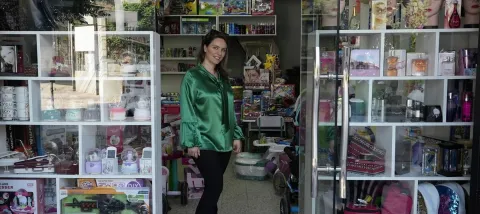
PUNCHING ABOVE HIS (FINANCIAL) WEIGHT
Ayman Radwan is the owner of the “Scorpion” sports club, which he opened in March 2020, in Tripoli.
He soon realized that practitioners of martial arts need training machines to work on their core training. “It’s very important to work on fitness three times a week, to keep your muscles in condition.” The problem is that these machines are very expensive. The club’s income barely paid Radwan’s rent, cleaning costs, and the wages of his sole employee. “I couldn’t put enough money aside each month to purchase equipment,” he says.
Thanks to Watad, Radwan was able to present his project, provide a list of the equipment he required, and draw up a two-year business plan. “I’ve learned a lot, like how to divide my profits among employee wages, equipment maintenance costs, and personal expenses.”
Ruwwad supplied him with the sports equipment he needed, worth over €7,000, including a bench press, dumbbells, a leg press and weights.
Today, Radwan’s Scorpion club has become a comprehensive sports facility. “Now members don’t need to change clubs if they want to do fitness: they stay with us because we have the equipment here,” he says.
His club has become well known over the past three years, and Radwan has been able to recruit four employees and has even signed contracts with three Lebanese sports federations, which hold their regional competitions in his gym.
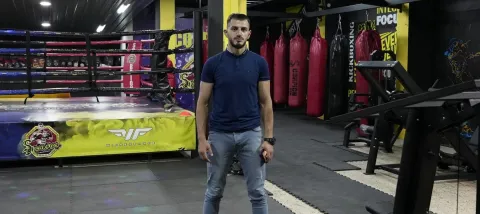
THE SWEET SMELL OF (UNEXPECTED) SUCCESS
Safa Masri, a 41-year-old mother of five daughters, began selling cinnamon rolls from her home in Tripoli’s Qobbeh neighborhood. “I started with just a beater and an oven at the time, and in 2020, we drummed up the courage to open a shop.”
But the pastries were a big hit, and Safa lacked the capacity to keep up. “Demand was high, because people really enjoyed my cakes, so I wanted to buy the equipment bit by bit. But I couldn’t save because of the depreciation of the Lebanese pound. At one point, we were even thinking of closing the shop and resuming production at home.”
Help was at hand. Ruwwad Al Tanmeya, via the Watad project, provided Masri with a full range of equipment, including a refrigerator, a refrigerated display case, and a double boiler, helping her to meet the ever-rising demand.
Training from Watad also provided her with skills in marketing, finance, accounting, and networking. “I’ve learned things I hadn’t known, like the right price for the cakes I sell. I’ve met a lot of people enrolled in the training, including suppliers I now source from,” says Masri. In just three years, she has built up her business and laid the foundations for it to last. “My brand is recognized, my market has expanded, and I now supply restaurants and universities.”
With about 300 regular customers a month, Masri has hired two employees – not counting some of her daughters, who have finished their studies and now work in the family business.
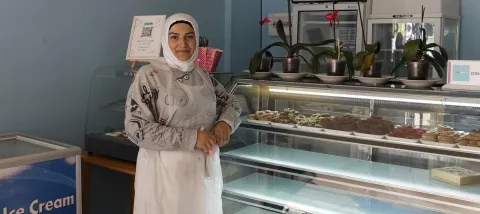
TRAINING & NEW EQUIPMENT REVS UP BUSINESS
Moussa Khodor, age 29, operates a car repair shop in the working-class neighborhood of Jabal Mohsen. He’d had his project in mind for a long time: “I needed equipment. When we had to take an engine out to work on it, we had to lift it out ourselves, turning it left and right, which was extremely hard work.”
Khodor heard about the Maharat Li Loubnan 2 (MLL2) project from a friend who received help, and signed up. When IECD provided him with modern equipment, the backbreaking manual heaving of engines were soon a thing of the past. “[We received] a hoist to lift engines and a battery-powered screwdriver to keep working during the very frequent power cuts, which makes a big difference in terms of speed and comfort,” he says.
He also received training as part of the scheme, which has helped expand his skills considerably. “I didn’t know I could develop and expand my business,” he says. “A software program now calculates my expenses, profits, and losses at the end of the month, and it issues invoices. I have a file for each customer, with the repair history of their vehicle.”
Business is picking up, and he now plans to obtain an electronic scanner and an annex dedicated to repairing air-conditioning systems.
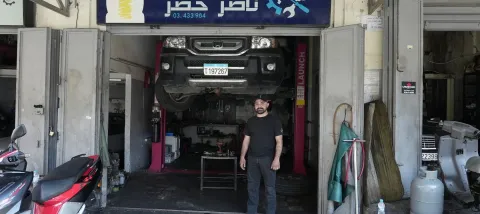
-
"Maharat Li Loubnan 2": €5 million allocated – 500 entrepreneurs trained – 80% of beneficiaries started their own business
-
"Watad": €1+ million allocated – 112 projects selected for training – 67 companies received equipment
